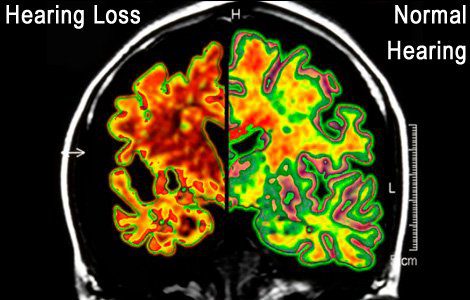By Barry Keate
Barry Keate, has lived with tinnitus over 40 years and has published 150+ research articles on numerous aspects of tinnitus. He is an expert on the condition and a well-known advocate for those with tinnitus.
It has become increasingly apparent to researchers in recent years that untreated hearing loss leads to greater incidence of cognitive decline and dementia. This also leads to increased medical costs for related falls, depression, reduced quality of life, increased emergency room visits and hospitalizations. However, fewer than 20% of adults with hearing loss report using hearing aids.
Untreated Hearing Loss and Cognitive Decline
Currently, 38.2 million Americans aged 12 or older have hearing loss. This is a problem that becomes more common with age. More than half of people in their 70s and more than 80% in their 80s have mild to moderate hearing loss or worse, according to the National Health and Nutrition Examinations Survey between 2001 and 2010. (1)
In a systematic review of 36 clinical studies that include 20,264 participants, hearing loss was significantly associated with declines in all main cognitive domains and with an increased risk for cognitive impairment and dementia. Alzheimer’s disease did not show significant increases. (2)
Researchers at Johns Hopkins found that in five years, untreated hearing loss increased the risk of dementia by 50% and depression by 40%, compared to those without hearing loss. (3) Studies indicate that hearing loss precedes the onset of clinical dementia by 5-10 years.
“Within 10 years, untreated hearing loss accounted for 3.2% of all cases of dementia,3.57% of people seriously injured in a fall, and 6.88% of those seeking treatment for depression,” said the Johns Hopkins researchers. “The percentages are small but given the millions of people afflicted with hearing loss, they affect a very large number of individuals, resulting in great personal, financial and societal costs.”
The reason for this is older adults with hearing problems lose brain volume more quickly than peers with normal hearing. The ear is no longer sending clear messages to the brain. Without that input, brain regions that process sound start to deteriorate.
This shrinkage in brain volume is serious and profound. In the graphic below, the left scan shows how much shrinkage there is in a person with hearing loss compared to one without, on the right scan.

Those brain regions also have other functions. They play a role in memory and processing information other than sounds. People who can’t hear well often become socially isolated and deprived of stimuli that keep the brain cognitively engaged. As input lessens, so does brain function.
Hearing loss is not necessarily a volume issue; it’s a quality of sound issue. Certain parts of words drop out and speech sounds like mumbling. A garbled message is sent to the brain that it has to work harder to decode.
When information is not heard clearly it impedes memory. The key to memory is paying attention. The brain can’t focus on the words when it is working overtime to decode the signal.
Age-related hearing loss comes on very slowly, making it harder for people to know when to take it seriously. There are two good clues as to when to get your hearing tested: family members or friends saying you should or noticing that you often mis-hear or don’t know what others are saying.
Increased Medical Costs Associated with Hearing Loss
When the Medicare law was passed in 1965, coverage for hearing aids and accompanying services was specifically excluded. Hearing loss, at the time, was not generally recognized as a medical issue and hearing aids were not very effective. Most private health insurance policies also do not cover hearing loss.
But the added medical costs associated with hearing loss far outweigh the cost of providing hearing aids to everyone who needs them.
In a recent paper published in JAMA Otolaryngology – Head & Neck Surgery, researchers examined claims for health services for people with and without untreated hearing loss. (4) They found untreated hearing loss was associated with an additional $22,434, or 46% higher, total health care cost over a 10-year period.
Hearing loss is associated with negative health outcomes, including cognitive decline, incident dementia, falls, depression, reduced quality of life, and an increased number of emergency room visits and hospitalizations.
The time has come for hearing protection and treatment of hearing loss to be taken much more seriously. If you or a loved one has untreated hearing loss, please make sure this issue is addressed. Hearing aids don’t do much to calm tinnitus, but they are extremely valuable in maintaining a good quality of life, avoiding increased cognitive decline, and sustaining a high level of mental alertness.
References:
2 – Loughrey BA, Kelly ME, Kelley GA, et al. Association of Age-Related Hearing Loss with Cognitive Function, Cognitive Impairment and Dementia: A Systematic Review and Meta-Analysis. JAMA Otolaryngol Head Neck Surg. 2018;144(2):115-126.
3 – https://www.nytimes.com/2018/12/31/well/live/hearing-loss-threatens-mind-life-and-limb.html
4 – Reed NS, Alton A, Deal J, et al. Trends in Health Care Costs and utilization Associated with Untreated Hearing Loss Over 10 Years. JAMA Otolaryngol Head Neck Surg. 2019;145(1):27-34.
